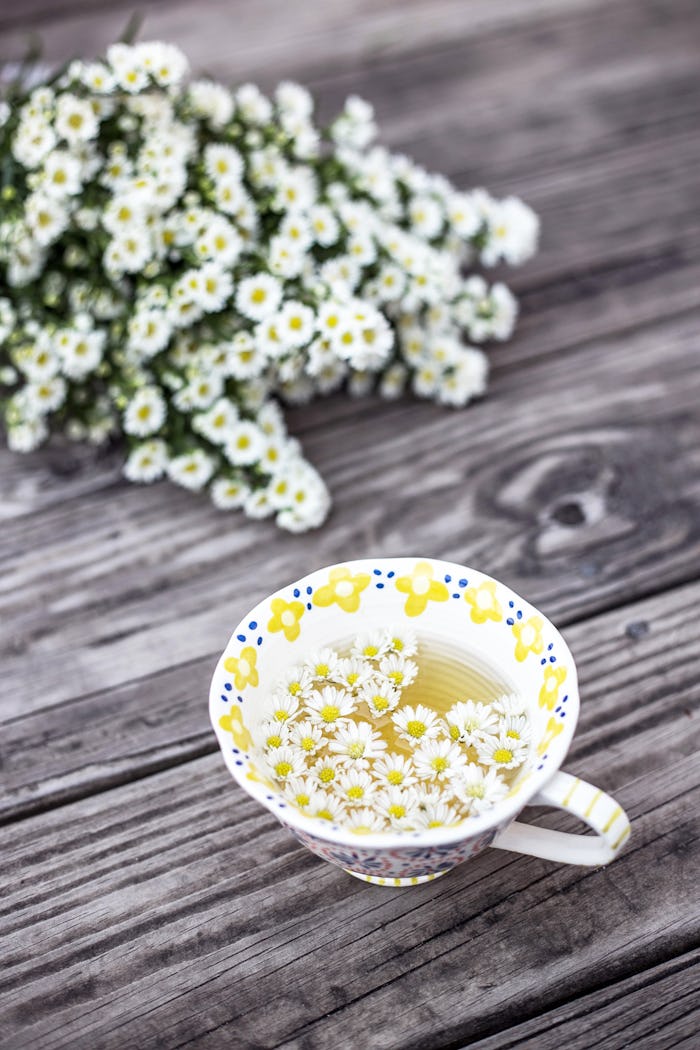Life

6 Foods That Prevent Cramps For A More Peaceful Period
Let's face it — just about everything relating to that time of the month is a bit of a drag. From fatigue to moodiness to pain, well, it's not exactly a monthly highlight. PMS pain can be prevented (or at least alleviated) a number of ways, but if you're looking for a non-pharmaceutical solution the answer just might be in your fridge or pantry. Many foods that prevent cramps do so because they're high in a specific nutrient, whether that be calcium, vitamin D, or something else entirely.
Rather than reaching for that tub of ice cream, glass of wine, or bag of chips while curled up on the couch (been there, girl), consider a healthier pick that'll actually do something to help other than just make you feel better. In fact, chips, ice cream, and wine can all potentially make PMS symptoms worse instead of better. According to The Huffington Post, the salt in snack foods makes you bloat, while sugar acts as an inflammatory and alcohol prevents excess estrogen secretion. And your morning cup of coffee? Women's Health noted that caffeine can help alleviate that fatigue you feel and help reduce pain from cramping. A study published in the American Journal of Public Health, however, found that for some women, drinking caffeinated sodas, teas, or coffee can actually make PMS symptoms worse.
Although you don't necessarily have to give up comfort foods entirely (every woman's different), changing what you eat when dealing with your period can go a long way. Cramps? What cramps? These six foods can help provide some sweet relief.
1Ginger
Great for nausea and upset tummies, one 2009 study found that ginger can function as effectively as ibuprofen when it comes to pain relief due to menstrual cramps. Though more research is probably needed to make a definitive connection, adding ginger to your diet is fairly easy to do. Add it to tea, stir-fry sauces, vinaigrettes and more.
2Dark, Leafy Greens
According to the National Institutes of Health (NIH), dark, leafy greens such as kale and spinach are good sources of calcium and magnesium, making them effective PMS combatants. How so? According to The Washington Post, calcium can help ease that-time-of-the-month mood swings and help you de-bloat. Women's Health notes that magnesium helps lower stress, and too much stress can make cramps and other PMS symptoms worse.
3Salmon
Salmon is high in good-for-you omega-3 fatty acids. A 2013 study found that omega-3 fatty acids appear to help ease PMS symptoms and that the results, including reduction of anxiety, feelings of depression, headache, and breast tenderness, increased the longer that study participants increased their daily dosage.
4Chamomile Tea
Next time cramps strike, consider sipping on a few cups of chamomile tea. English researchers have found that people who drink chamomile tea have higher levels of an amino acid that alleviate muscle spasms, like those that hit around the time of your period.
5Broccoli
According to Women's Health, high-fiber foods are super important when suffering from PMS symptoms. Many fresh fruits and veggies, including broccoli, also contain other vitamins and minerals (such as vitamin E) that can help ease bloating and muscle cramping, as well as gas and other sources of discomfort.
6Lentils And Other Pulses
According to the Global Pulse Confederation, pulses are the parts of legumes that are dried and eaten, for example, beans, lentils, and chickpeas. Lentils are high in iron, according to Women's Health and, according to a study published in The American Journal of Epidemiology, iron-rich foods may actually be able to prevent PMS symptoms like cramps from showing up in the first place.